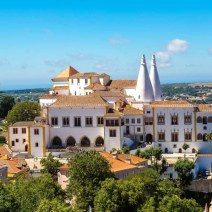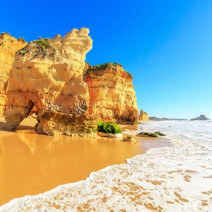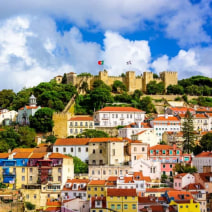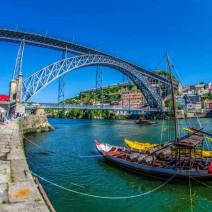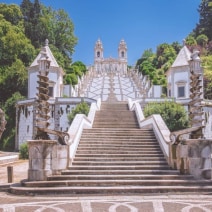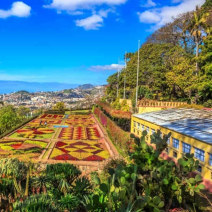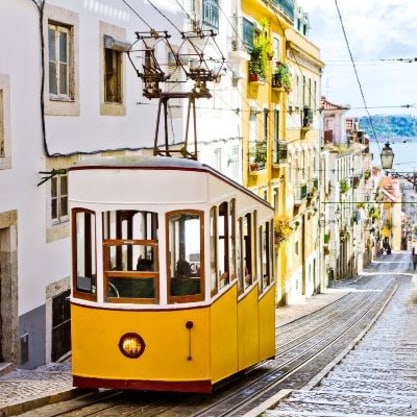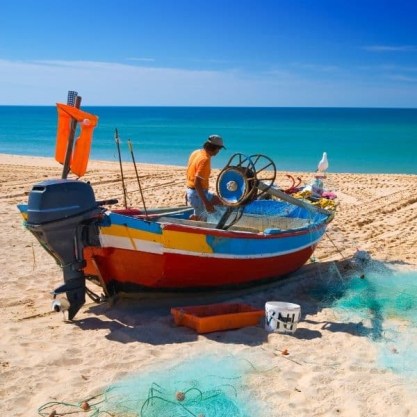Portugal Travel Guide
Whether you're looking for history, nature, culture, or simply a relaxing beach getaway, there are plenty of things to do and places to visit in Portugal.
Located on the Iberian Peninsula in southwestern Europe, Portugal is the westernmost country of mainland Europe, being bordered to the west and south by the Atlantic Ocean and to the north and east by Spain. The country also contains the Atlantic archipelagos of the Azores and Madeira, both autonomous regions with their own regional governments. The country has a population of 10 million, its capital and largest city is Lisbon, and the official language is Portuguese.
Sun seekers will be delighted with the Algarve region as it boasts superb beaches with quaint villages dotting the coastline. In the cosmopolitan capital of Lisbon, history buffs can learn more about the country’s significant maritime history at the Belem Tower, a fortress used by Portuguese explorers and a symbol for Europe's Age of Discoveries. Visitors to Porto can enjoy the city's famous port wine, tour its wine cellars, explore its historic centre, a UNSECO World Heritage Site, and take a stroll along the charming Douro riverfront. The enchanting island of Madeira offers incredible natural landscapes, picturesque villages and a superb climate all year round.
We've outlined some top tips and recommendations below that may help you plan for your next holiday to Portugal.

Time Zone & Currency
Mainland Portugal and Madeira is on Greenwich Mean Time (GMT) throughout the year. The currency in Portugal is the Euro.

Weather In Portugal
Portugal experiences a typical Mediterranean climate with warm summers and wet winters. The summer heat is cooled by sea breezes making the conditions extremely pleasant. Maximum temperatures reach approximately 25°C and the country experiences about 11 to 12 hours of daylight per day during this season.

Reading For Your Trip To Portugal
Night Train to Lisbon by Pascal Mercier
Port and the Douro by Richard Mayson
The Unknown Islands by Raul Brandão
Best time to go to Portugal
September to November are the most popular times for Portugal holidays, as well as March to June.
Top Tourist Attractions In Portugal
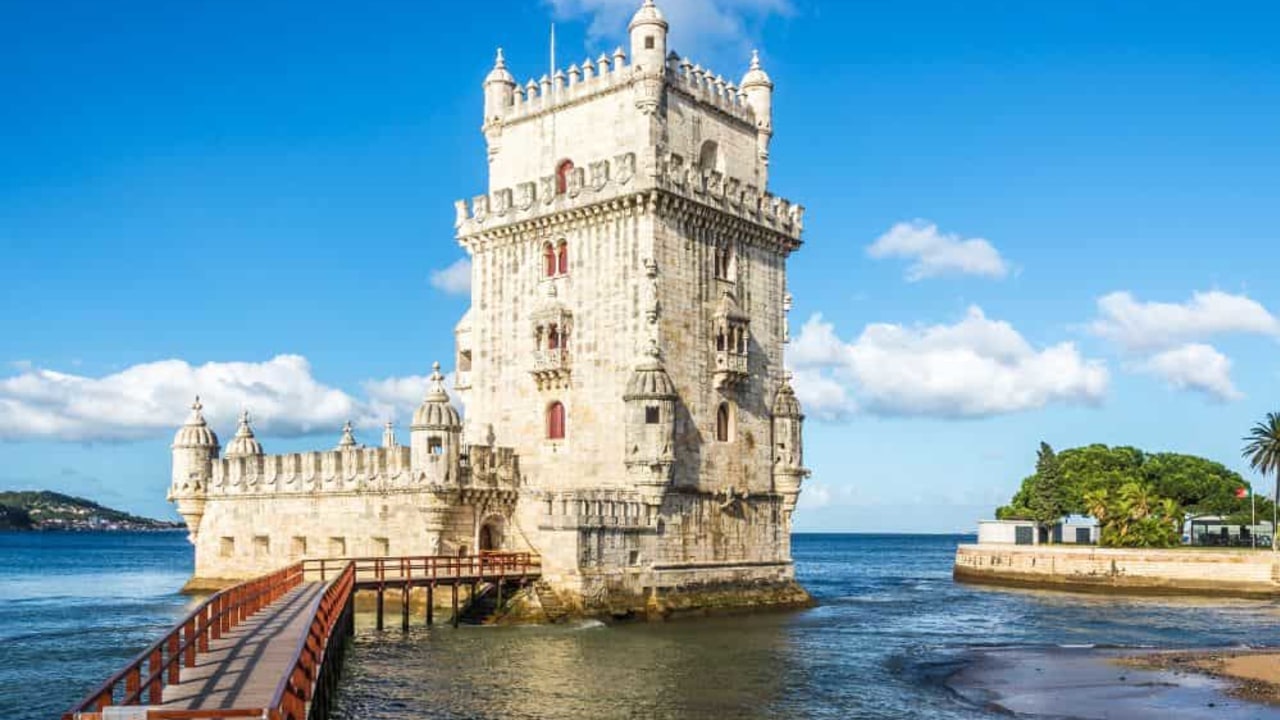
Why you need to visit Lisbon
The capital of Portugal, Lisbon is a colourful city which offer the perfect combination of history, culture and cuisine. From seeing the iconic landmark of Belem Tower to sampling tasty Pastel de nata, which were invented in Lisbon.
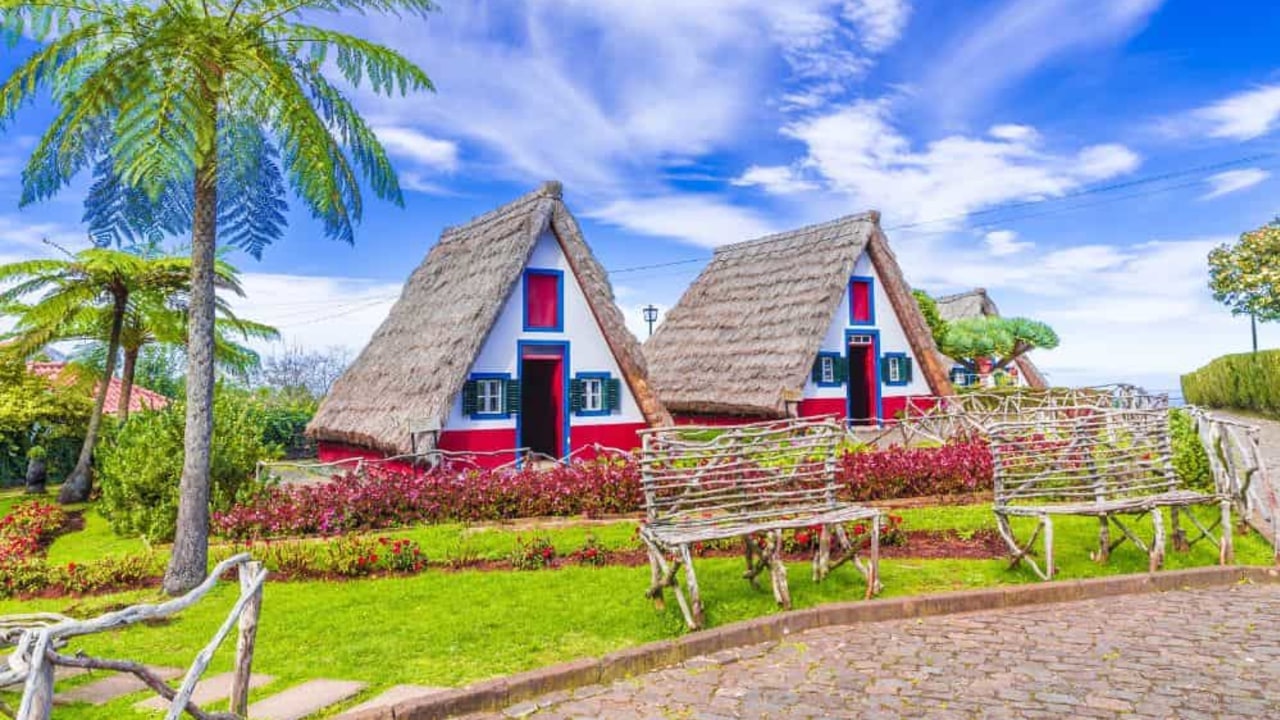
10 Things to do in Madeira
Madeira is a Portuguese island located over 600 miles away from the mainland in the Atlantic Ocean. It's known as the 'Pearl of the Atlantic' due to its majestic scenery and natural landscapes.

Virtual Tour of Portugal
Our expert guide Paula Moreira takes us on a tour of her favourite places from Lisbon to Sintra and more.
Food and drink in Portugal
Portuguese cuisine is full of flavour and character, with plenty of regional specialities to explore – often at excellent value. Some must-try dishes and drinks include:
- Bacalhau: Salted cod prepared in countless ways – from baked with cream to fried with potatoes – a staple across the country.
- Grilled Sardines: Fresh sardines cooked over charcoal, especially popular during summer festivals and often served with crusty bread.
- Caldo Verde: A comforting soup made with potatoes, kale and slices of smoked sausage, traditionally enjoyed in the north.
- Alentejano Pork: Slow-cooked pork from the Alentejo region, often prepared with clams, herbs and garlic for rich flavour.
- Queijo da Serra: A soft, creamy sheep’s milk cheese from the Serra da Estrela mountains – deliciously rich and spreadable.
- Pastéis de Nata: Iconic custard tarts with a caramelised top and flaky pastry – best enjoyed warm, straight from a Lisbon bakery.
- Vinho Verde: A refreshing, lightly sparkling white wine with low alcohol – ideal with seafood or on a sunny afternoon. Douro, Dão and Alentejo Wines: Portugal’s red and white wines are globally recognised for their quality and depth, often available at great prices.
Portugal also produces a wide variety of regional liqueurs, and of course, its famous Port wine. Whether you’re dining by the sea or in a rustic countryside taverna, you’re sure to eat and drink well.
Portugal Travel Guide FAQs
Can you give a brief history of Portugal?
Portugal has a fascinating history, for many centuries it was under the rule of the Moors and their influence can still be seen today in some historical sites and even Portuguese cuisine. During the 15th and 16th century, the "Age of Discoveries" period brought wealth and influence to the country with Portuguese explorers like Vasco da Gama and Ferdinand Magellan embarking on ambitious voyages and helping to establish key trade routes and empires around the world. Portugal did have a monarchy up until 1910, when a revolution took place and this was soon followed by a dictatorship led by António de Oliveira Salazar from 1932 to 1968. The Carnation Revolution in 1974 overthrew the totalitarian Estado Novo regime and Portugal became the democratic country we know it as today.
Do I require a holiday visa to travel to Portugal?
All EU/EEA nationals must present their valid passport on arrival in Portugal. A visa is not required for EU passport holders. For information on visa requirements for non-EU citizens, we recommend you contact the Portuguese embassy or consulate in your country of residence. UK citizens can find further information by visiting www.gov.co.uk
Is it safe to tour Portugal
The places visited while touring Portugal are generally safe and our guides will always keep an eye out for you. However, in any large city there can be opportunists and pickpockets. It is wise to be vigilant, especially at busy tourist attractions, and always take good care of your personal belongings. Make use of the safe at your hotel, and carry a photocopy of your passport when out and about. Always take extra care when using public transport.
Can I use my bank cards while holidaying in Portugal?
Most bank cards can be used in Portuguese ATMs. Most retailers accept major debit and credit cards. We recommend you contact your bank/card provider to check if charges will apply.
What advice do you have for tipping in restaurants while in Portugal?
Tipping is not obligatory, however wages for those working in restaurants and cafes are low, thus tips will always be welcomed. Tips for hotel staff who have offered exceptional service will also be appreciated.
What kind of plugs / sockets are used in Portugal?
In Portugal the power sockets are of type F; these are the two prong outputs. The standard voltage is 220V and the standard frequency is 50Hz. We recommend you always pack a universal adapter as this will be able to work in any country you visit.
Useful Links
- For up-to-date information regarding entry into Portugal please see: www.gov.uk
- Official Portuguese Tourism Board: www.visitportugal.com
